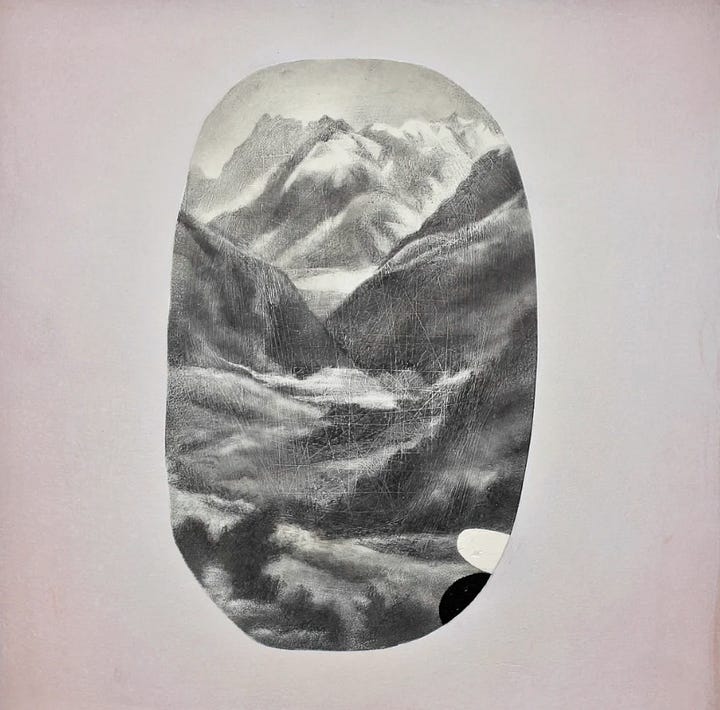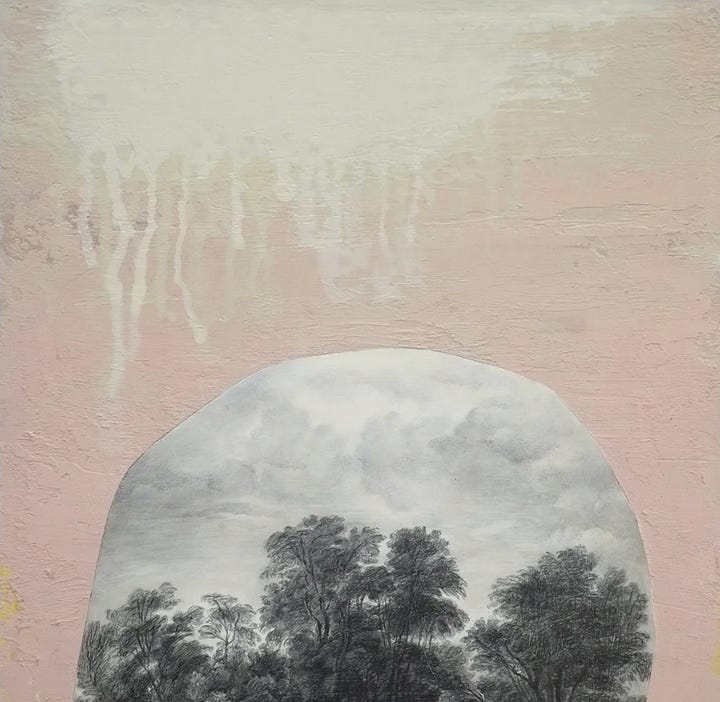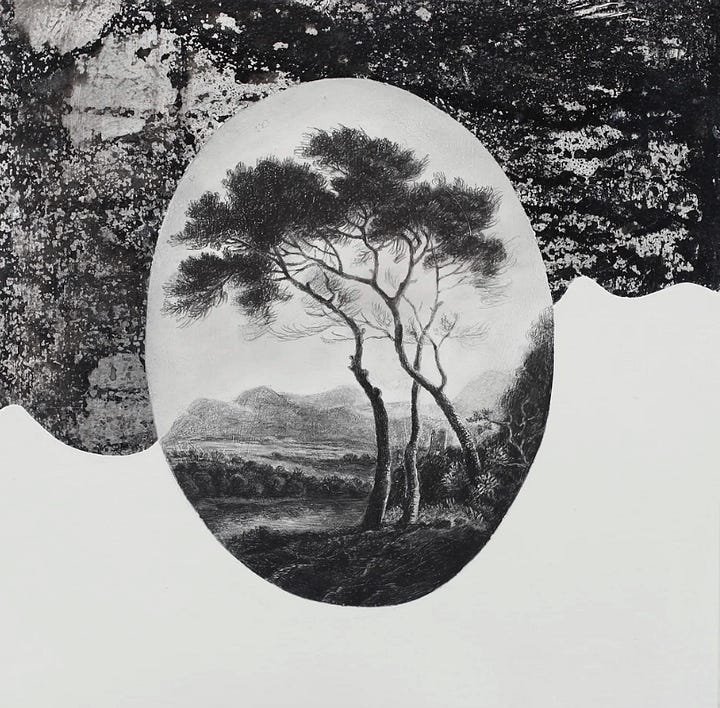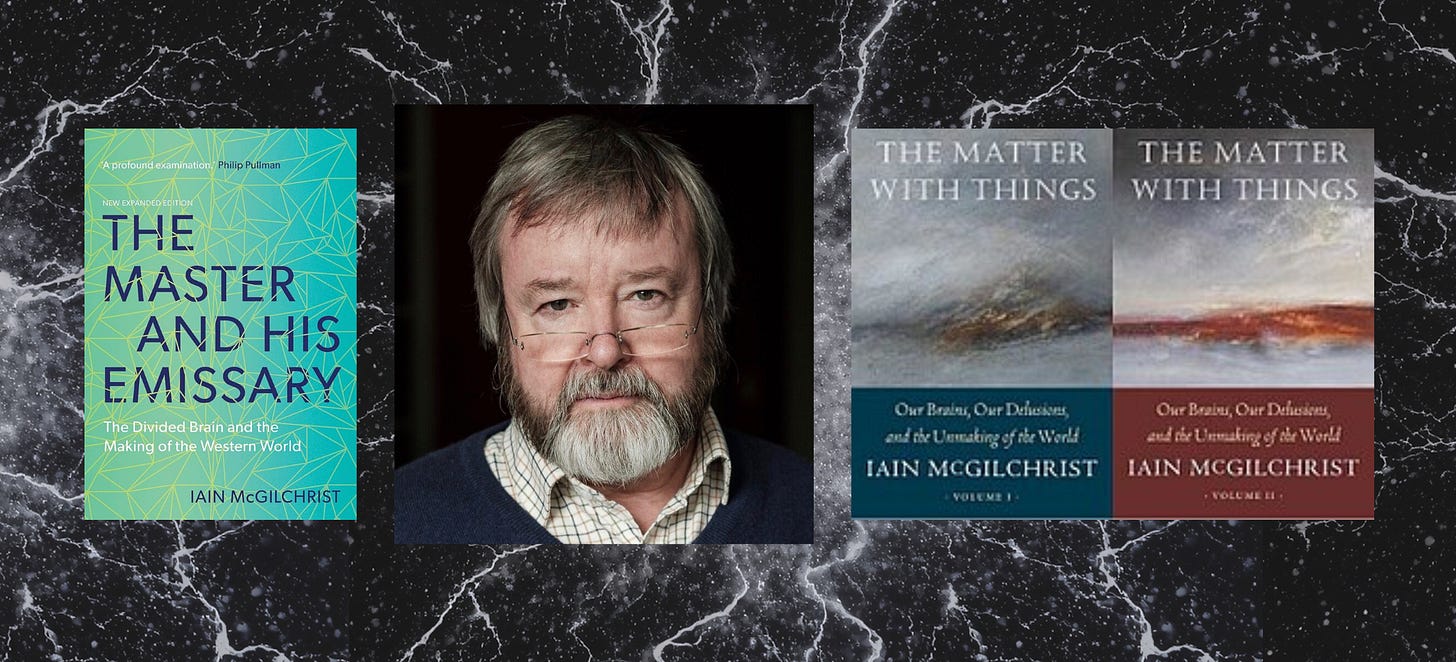Seeds of a Second Renaissance Issue 8 (Sep 2025) – Iain McGilchrist’s Hemisphere Hypothesis
An intro to Iain McGilchrist’s game-changing account of the brain’s hemispheres - which transforms understanding of human consciousness. Plus, events & opportunities for inner-led change.
Welcome to Seeds of a Second Renaissance—a monthly newsletter for explorers of inner-led change towards radically wiser societies. For both seasoned travellers and those new to these shores, each edition offers a bite-sized exploration of keystone ideas, and thinkers whose work you may wish to know more deeply.
This month, Iain McGilchrist’s game-changing account of the brain’s hemispheres—and how a particular way of paying attention has given rise to our socio-ecological crises.
Below, you’ll also find curated events, jobs, and opportunities.
Iain McGilchrist: “Reality changes with the nature of the attention we pay to it”
Iain McGilchrist (born 1953) is a British psychiatrist, neuroscience researcher, philosopher, and literary scholar. He rose to prominence with two monumental books, that weave together neuroscience and metaphysics to transform understanding of human consciousness: The Master and His Emissary: The Divided Brain and the Making of the Western World (2009) and The Matter with Things: Our Brains, Our Delusions and the Unmaking of the World (2021).
McGilchrist’s most cited theory concerns the distinct adaptive functions of the brain’s two hemispheres, and how their different modes of attention shape the world we perceive and create. An imbalance between these two modes of perception gives rise to manifold dysfunctions in modern society. His ideas are influential across the Second Renaissance landscape: read on for a bite-sized introduction.
The hemisphere hypothesis
“The brain’s left hemisphere is designed to help us ap-prehend—and thus manipulate—the world; the right hemisphere to com-prehend it—see it all for what it is.”1
Neuroscientists have long known that the human brain is divided into two non-identical hemispheres of similar size, but the function of this separation has remained a topic of debate. A popular myth—that the left hemisphere governs reason, logic, and language, while the right hosts creativity, emotion and image—was long ago debunked.
McGilchrist proposes that the principal difference between the hemispheres is the way they pay attention: two profoundly different ways of looking at the world; both of which were vital for survival in our ancestors’ evolutionary landscape. Narrowly focused upon separate details, left hemisphere awareness (LH) supports short-term goals that involve grabbing and controlling familiar aspects of our environment—such as obtaining the right food. Meanwhile the right hemisphere (RH) is broadly vigilant and alert to emergent danger—awake to the whole picture of the world around us.
McGilchrist notes that because our mode of attention shapes the world we encounter, the hemispheres render two fundamentally different realities. The left hemisphere builds stripped-down maps that facilitate action; while the right remains coupled to real-time experience; present with the fullness of ‘ever-flowing’ reality, including that which simply can’t be grasped. Thus, LH consciousness gives rise to a virtual world of inert, isolated parts; while the RH experiences direct relationship, within a complex, continuous, meaning-full whole.
The divide is expressed acutely when the LH is suppressed, through injury or clinical processes such as transcranial magnetic stimulation: “people see things that we would call inanimate sometimes as animate. And if you do the opposite and suppress the right hemisphere, they begin to see even people and animals as machines or pieces of furniture.”2
Hierarchical realities
“There is a sense in which we no longer live in a world at all, but exist in a simulacrum of our own making… we are now mesmerized by the least intelligent part of the human brain.”3
McGilchrist proposes that while both hemispheric functions are vital, and can work well in harmony, the RH’s reality is fundamentally more in touch with the world—and that the LH’s abstracting, grasping function evolved as ancillary to this more primary, whole-istic understanding—hence, The Master and His Emissary. Healthy individuals, groups, and societies encounter the world through direct presence (RH), focus on specific parts to map and analyse how we might act upon them (LH)—then, crucially, reintegrate the results of this LH analysis into a broader and deeper picture of the interconnected whole: the Emissary submits to the Master.
Whereas the right hemisphere values the function of its counterpart, the same is not true of the left. In fact, our LH harbours an inflated self-confidence; experiencing its partial understanding as total, and filtering out information that doesn’t fit its model of reality. McGilchrist gives the example of stroke victims who have suffered right hemisphere damage resulting in partial paralysis, denying that anything is wrong—even claiming to have moved the limb in question or inventing stories about the limb belonging to someone else.
A society out of balance
“The very brain mechanisms which succeed in simplifying the world so as to subject it to our control militate against a true understanding of it. Meanwhile, compounding the problem, we take the success we have in manipulating it as proof that we understand it. But that is a logical error: to exert power over something requires us only to know what happens when we pull the levers [or] press the button…It is hardly surprising, therefore, that while we have succeeded in coercing the world to our will to an extent unimaginable even a few generations ago, we have at the same time wrought havoc on that world precisely because we have not understood it.”4
The left hemisphere isn’t “bad”—indeed, its analytical strength has vastly extended the reach of human ingenuity and power over our environment. For this very reason, the structures of modern society have come to embody a LH (mis)understanding of the world; reflecting it back to us wherever we go, and reinforcing our tendency to trust it. Accelerated by the industrial revolution, the LH has built a world in its own image; over-valuing the virtual, technical, mechanical and bureaucratic; fixated on control. Empowered by the LH-centric tools of logic and scientific method, we treasure only what we can measure and dismiss everything that resists the model as less important—even less real.
In this impoverished, atomistic reality; fixated upon the “explicit, definable, and controllable,” we are increasingly cut off from what’s sacred—including the living world, beyond its ‘utility’. The cost of getting stuck in this feedback loop, conditioned by an inanimate, mechanical view of life, is manifesting in crises of runaway extractivism and social breakdown.
“The left hemisphere’s vision of a lifeless, mechanical, two-dimensional, geometric construct has been externalized around us to such a degree that when the right hemisphere checks back with experience, it finds that the left hemisphere has already colonized reality.”5
Re-balancing the hemispheres
Hemispheric theory isn’t the limit of McGilchrist’s work—far from it—but its deep diagnostic power for our crisis-hit times has established him as a cornerstone of social philosophy in the ‘Second Renaissance ecosystem’. It’s widely agreed that we require an urgent re-balancing of the hemispheric strengths. Science and intuition; logic and a sense of the sacred; all are needed to steer us wisely through a time of potential collapse—with the rightful ‘Master’ restored to the helm.
McGilchrist resists advising his eager interlocutors on what to ‘do about’ our societal imbalance—emphasising that linear problem-solution thinking is very left-hemispheric, and inappropriate to our complex predicament. But he does point to periods of time when dawning civilisations have demonstrated better (hierarchical) relationship between the two hemispheres. Extraordinary flourishing has arisen from periods of skilful enquiry combined with non-attachment to certainties and openness to possibility. Our societal view gradually narrows as the maintenance of civilisation ossifies into structures and rules that lead us to forget how things really are; tending ultimately towards collapse.
As collapse unfolds around us there may be little we can do to ‘fix’ it—but we remain free to cultivate ways of being that reintegrate our conceptual skill within a wider, ‘holistic-intuitive’ view. Practising wonder, humility and compassion can help us loosen fixed assumptions and inhabit curious, connected awareness. If you’re wondering where to start, many meditative practices engage right hemisphere awareness—and sustained practice can bring lasting change.
“Stepping out of this world-picture and back into the world, stepping out of suspended animation and back into life, will involve inverting many of our perhaps cherished assumptions.”6
At over 2000 pages in total, McGilchrist’s The Master and His Emissary and The Matter with Things make a daunting reading list. (Did we read them entirely before writing this? We couldn’t possibly comment.) For a stepping stone into this work, try the RSA’s animated introduction, ‘The Divided Brain’ (12 minutes) and David McIlroy’s introduction to The Matter with Things, ‘Understanding Iain McGilchrist’s Worldview’.
Explore the field of inner-led change…
A selection of events and opportunities recommended by readers, friends, and allies in the arena of inner-led regeneration.
👋 Help us to showcase the best opportunities and resources: please suggest items to include in the Events, Offers & Links or Jobs Board WhatsApp channels.
Upcoming Events
Facing Human Wrongs: Leading in the Metacrisis
📍Online 📅 Start date: 4 October 2025. Register by 27 Sep. 💸 Base fee: $650 CAD
This 6-week online course “explores the stories that have given rise to the dominant global culture and the engines that drive the metacrisis we face. It offers tools that can help us see our own leadership behaviours that perpetuate, rather than improve, our broken systems, and create deeper trust and understanding (allowing us to lead with greater integrity). This inquiry is designed to support you in the hard work needed to “unlearn” the stories that led to the metacrisis and experiment together with new ways of knowing, being and leading.”
Emergent Dialogue: A Practice of Interbeing
📍Online 📅 Starts 8 October 2025 💸 €320-500 per module. Financial support available.
A practice programme in Emergent Dialogue: “a practice that enables groups to open the field of Interbeing and to cultivate the capacity to co-create with its intelligence. …The power of this practice is to discover new creative potentials and capacities of co-leadership with an intelligence greater than any individual. Through this collective practice, you become an agent of emergence, discovering how to synergize diversity from the ground of wholeness and thereby become a force for deep individual and cultural change.” The three core modules are on: coherence, conscious co-creativity, and intersubjective sense-making.
Cultural Healing Convocation: A gathering for reckoning, reclaiming, reimagining
📍Online 📅 24-25 October 2025 💸 Pay what feels right, starting from $10
“The culture that separates us from ourselves, each other, and the earth can be healed and you have a role to play. Whether you’re new to this work or have been walking this path for years, this Convocation creates space for anyone called to be part of cultural healing. You’ll gather alongside traditional wisdom keepers, cultural bridge-builders, trauma-informed practitioners, community organizers, and fellow seekers who understand that personal healing and cultural change are inseparable.”
Liminal Learning Quest
📍Elbow Lake, Ontario, Canada 📅 19-24 October 2025 💸 From $2200. Some scholarship places available.
A hybrid programme for young people aged 18-24 which supports wayfinding in work, life, and social contribution: “We start with a weeklong Quest in the wilderness. You’ll join 15 or so other explorers and a handful of Guides. There will be campfires and canoes, exercises in contemplation and self-reflection, and an invitation to get real together — about fears, hopes, and dreams about living a purposeful life. A Quest is more than just a retreat. It’s a transformational experience designed to help you gain clarity, resilience, and a deeper sense of purpose.”
Jobs & Opportunities
[Funding] Sparks of Regeneration: An Invitation to Innovators, Disruptors & Change-makers
📅 Application deadline: 9 October 2025
“Are you launching or leading a project that embraces the principles of regeneration - whether you call it “regenerative” or not? Are you grounded in social equity, community-led change, and systems thinking? Do you believe in the power of global collaboration and local wisdom to shape just and regenerative futures? Apply now to be part of The Regenerative Futures Programme’s gathering of creative problem-solvers, a space to grow your ideas, connect with fellow change-makers, and contribute to a global field of regenerative practice.”
[Job] Freelance Narrative Researchers and Strategists at NEON
📅 Application deadline: 30 September 2025
“NEON is looking to expand our pool of trusted freelance narrative researchers, analysts, and strategists to support our growing messaging programme. If you’re a consultant experienced in progressive framing, messaging or narrative research and strategy – we want to hear from you! … NEON is a not-for-profit organization committed to accelerating social movements. We build capacity and infrastructure to accelerate the transition to a new economy.”
[Volunteer] Circles of Compassion project
📅 No application deadline stated
“Circles of Compassion is an early-stage project that was recently started by members of the Effective Altruism community. We aim to design, test, and implement interventions that are scalable and effective at expanding children’s Circles of Compassion — i.e. broadening which human and non-human sentient beings they experience compassion towards and feel compelled to act on in reducing their suffering.” They’re looking for an Operations Volunteer and two Research Volunteers.
[Job] Marketing & Community Cultivator at Singing with Nightingales
📅 Application deadline: 19 September
“Singing with Nightingales (SWN) is looking for a creative and free-thinking freelance thought partner and practitioner who can help us develop, and start to deliver, our marketing and communications strategy this autumn to help us achieve our aims for the coming year."
[Job] Development Director at Othering & Belonging Institute
📅 Application deadline not stated
The Othering & Belonging Institute (OBI) at UC Berkeley are hiring a Development Director: “If you are a dedicated leader in philanthropy, eager to build meaningful donor relationships and support our mission of creating a world where belonging without othering is the norm, we want to hear from you. Join us in our commitment to social justice, and together, let's make a positive impact! Your expertise could be the key to changing the world.”
Links & Resources
Voices of Emergence: a new podcast
“Voices of Emergence is a podcast and publishing space for real conversations about healing, transformation, and how we meet these times of change. We speak with creators, elders, culture-makers, and people asking deep questions and living into better ones. Many of our guests are navigating personal or collective thresholds. Some are forging paths through creativity, insight, or acts of leadership.”
Second Renaissance
*“Second Renaissance” is one way of framing current times as a period of civilisational crisis and potential renewal – and of pointing to an ecosystem of people and organisations working to catalyse the emergence of a new, regenerative, cultural paradigm. If you recognise terms like metacrisis, Metamodern, Regenerative, Liminal Web, Game B, Integral, conscious evolution and so on, then you’re on familiar ground. Explore the core thesis and theory of change in more detail here.
🌱 Help us to plant seeds of a Second Renaissance. If you want to support the movement, you can:
💬 Share your thoughts in the comments section
🎁 Share this newsletter with a friend
💸 Become a paid subscriber
Finally, we leave you with some —
Art to nourish the soul…




Artist statement (2017):
A’Court’s practice explores the notion of the visual sublime working within painting, collage and drawing, she employs re-imagined landscapes as a trigger for encounter or contemplation.
Classical landscape references are reinterpreted in a new context, rendered in graphite on a variety of surfaces. The form, composition and materiality are meticulously constructed to summon a state of mind rather than a specific location.
The tension between the precision drawing and the loosely painted ground references different models of art history and alludes to contrasting types of mental attention competing for the same psychological space.
A’Court invites curiosity of ones own mental states. Her interest has been formed by her meditation practice and by the ideas of pre-eminent psychiatrist and writer Iain McGilchrist in his book “The Master and His Emissary-the Divided Brain and the Making of the Western World”, presenting his research on the hemisphere differences and the different perspectives they have in constructing our current experience and impact on our society.
See Sue Williams A’Court’s work here and read Iain McGilchrist’s reflection on her work, Escape from Eden, here.
Thank you for reading the eighth issue of Seeds of a Second Renaissance.
Iain McGilchrist, The Matter with Things: Our Brains, Our Delusions and the Unmaking of the World (London: Perspectiva Press, 2021), Introduction.
'Iain McGilchrist: "Wisdom, Nature and the Brain" | The Great Simplification #85', Nate Hagens, 23 Aug 2023 [Podcast].
Iain McGilchrist, ‘Resist the Machine Apocalypse’, First Things, 1 Mar 2024.
McGilchrist, The Matter with Things, Introduction.
McGilchrist, ‘Resist the Machine Apocalpyse’.
McGilchrist, The Matter with Things, Introduction.




very nice introduction, thank you and I trust it will help others understand McGilchrist. I'd also like to see a little more on the dangers of undervaluing the LH, as the is the danger of the pendulum swinging too far the other way.